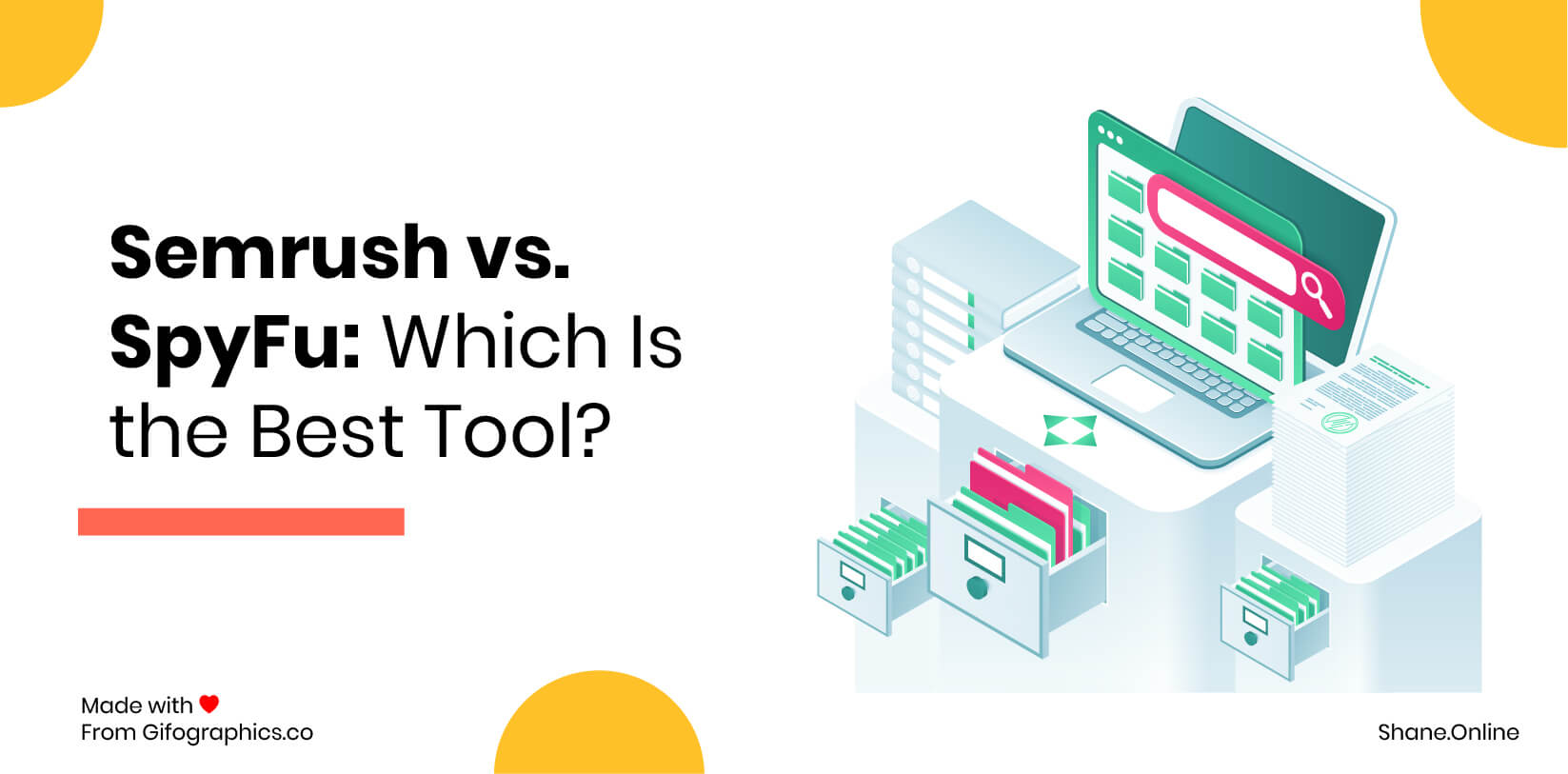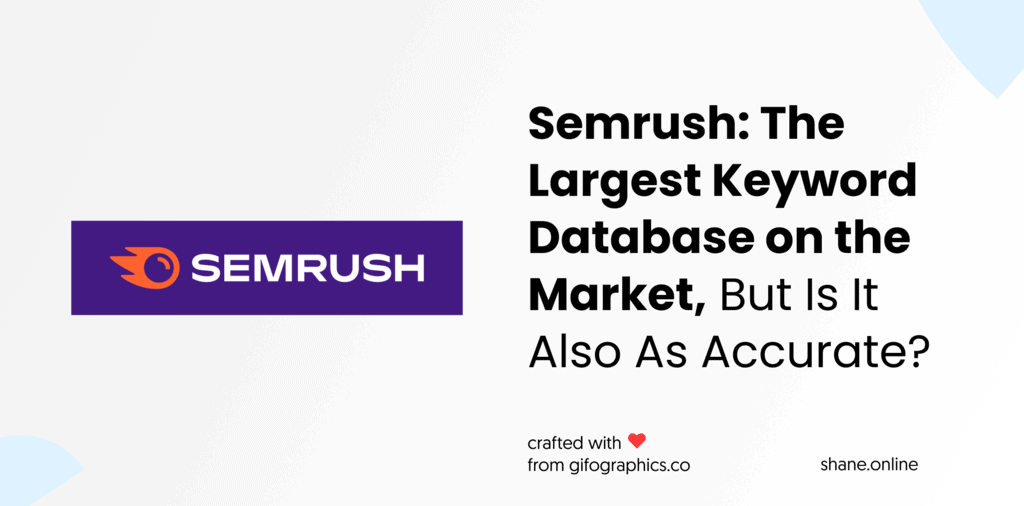SEO is indispensable when building a solid online presence for your brand. Having worked in the digital marketing industry for over two decades, I often come across conversations about choosing the best SEO tool.
Two popular SEO platforms are Semrush and Similarweb. In this article, I’ll compare how they stand against each other, their strengths and weaknesses, and how you can decide the right platform for your search engine optimization needs.
Let’s dive into an in-depth analysis of Semrush vs. Similarweb to ensure you make informed decisions.
What is Semrush?
Semrush is a leading online visibility management SaaS platform with over 21 international awards. Over 10M marketing professionals and 30% of Fortune 500 companies use Semrush as their go-to marketing tool.
Semrush enables you to run SEO, PPC, content, social media, and competitive research campaigns with measurable results from online marketing. It also helps increase your organic website traffic.
Its user-friendly interface and customizable reports make Semrush an ideal choice for small and large businesses. Check out my review of Semrush for an in-depth look at everything on offer.
What is Similarweb?
Similarweb is a website analytics platform that provides insights into website traffic, demographics, and audience engagement.
It offers valuable information for businesses, marketers, and online marketers to make informed decisions. With its user-friendly interface, you can easily track your competitors' website traffic and analytics, monitor market trends, and optimize your digital marketing strategies.
Similarweb's data is sourced from various sources including website cookies, on-device data, and direct measurement from websites and apps, ensuring the accuracy and reliability of its insights.
If you want to know all the nitty-gritty details of Similarweb, you’ll find those in my full Similarweb review.
Comparing Semrush vs. Similarweb
Let’s take a quick look at the key features and differences between Semrush and Similarweb.
Semrush | Similarweb | |
Pricing | Starts at $139.95/month for 1 user | Starts at $199/month for 1 user |
Semrush .Trends | $289/month per user Worldwide geo view with filters for specific countries/ subregions with 190+ countries included | Worldwide geo view only (cannot filter by specific country). Country filter at an additional cost per country (which can be very expensive) |
Website performance | Website performance by traffic channels including email, display, paid, and organic | Website performance with top traffic-driving channel details |
Historical data | 5 years of historical traffic data | 3-37 months of historical traffic data based on your plan |
Data source | Gets data from Google SERP analysis, clickstream, and keyword and backlink databases | Gets data from multiple search engines, website and app owners, contributors networks, and through partnerships with DPSs, ISPs, measurement companies, and corporate intelligence firms |
SEO features | Helps with custom SEO recommendations for on-site and technical SEO, link building, position rank tracking, local SEO, and more | Helps with website traffic monitoring and keyword generation only; no advanced SEO tools |
Market trends | Semrush .Trends feature offers market insights to help you explore industry trends, monitor competitors, get traffic analytics, and understand your market audience better | Similarweb provides basic market insights about your website’s global ranking. Its Market Research tool, which offers insights into your brand’s share in the market, is only available with custom packages. |
Free trial | Get a 14-day free trial with my link. | Get a 7-day free trial. |
Semrush vs. Similarweb: A Detailed Comparison of Their Features
Now that we’ve shown you Semrush’s and Similarweb’s key differences and features, let’s discuss how to use these tools for SEO, competitor research, and market analysis.
Semrush .Trends vs. Similarweb for Competitor and Market Research
Semrush .Trends is the closest Semrush tool to Similarweb 一 a direct competitor. It helps you get instant market insights to uncover industry trends and capture new business growth opportunities.
It offers tools like Traffic Analytics, Market Explorer, EyeOn, and One2Target to monitor your competitors, audience, and trends.
With Traffic Analytics, you can explore the website traffic stats of up to 5 competitors at once, including:
- Their daily/weekly/monthly/quarterly traffic (mobile and desktop)
- Forecasts of their future traffic and metrics
- Top trending pages
- Traffic channels and countries

The Insights section of the Top Pages report lists pages on your selected domain that are newly detected, declining in traffic, or growing in traffic.
These insights help you discover growth points and amplify your marketing strategy for higher traffic and engagement.
Semrush .Trends Traffic Analytics bases its report on petabytes of clickstream data acquired from multiple proprietary and third-party data sources, Semrush’s proprietary AI and machine learning algorithms, and big data technologies.
The data is accumulated and approximated from the user behavior of over 200 million real internet users and over a hundred different apps and browser extensions. Traffic Analytics data is not obtained from any website’s internal analytics.
On the other hand, Similarweb’s Website Analysis tool provides you insights into the following metrics about your competitors’ websites:
- Global and country rankings
- Worldwide traffic with device distribution
- Engagement overview – pages/visit, visit duration, bounce rate
- Daily/weekly/monthly visits over time

Semrush .Trends’ Market Explorer tool allows you to gain insights into any industry and benchmark yourself against competitors.


You can also identify the top keywords governing your market and use them to gain traction for your brand.

Similarweb’s Market Research feature offers insights into your market’s analysis, demand analysis, and conversion analysis. However, this Premium feature is only available with its custom plans (Team and Enterprise plans) and is not suitable for small businesses with limited budgets.
Semrush .Trends’ EyeOn competitor monitoring makes tracking your rivals’ online marketing activity simple, ranging from new pages and blog posts to Google search ads.

Its One2Target is a complete audience analytics solution that helps you understand your audience and how they engage online.

Overall winner: Semrush .Trends
All these insights make Semrush .Trends a much more valuable alternative to Similarweb for competitor and market research and analysis. You pay less with Semrush and get way more insights than Similarweb.
Semrush vs. Similarweb: Keyword Analysis
The main tools and dashboards for keyword research that Semrush offers are:
In this dashboard, you can get a detailed report on any particular keyword, including all relevant keyword data and keyword analysis. You can see metrics like volume, global volume, SERP features, keyword variations, etc.
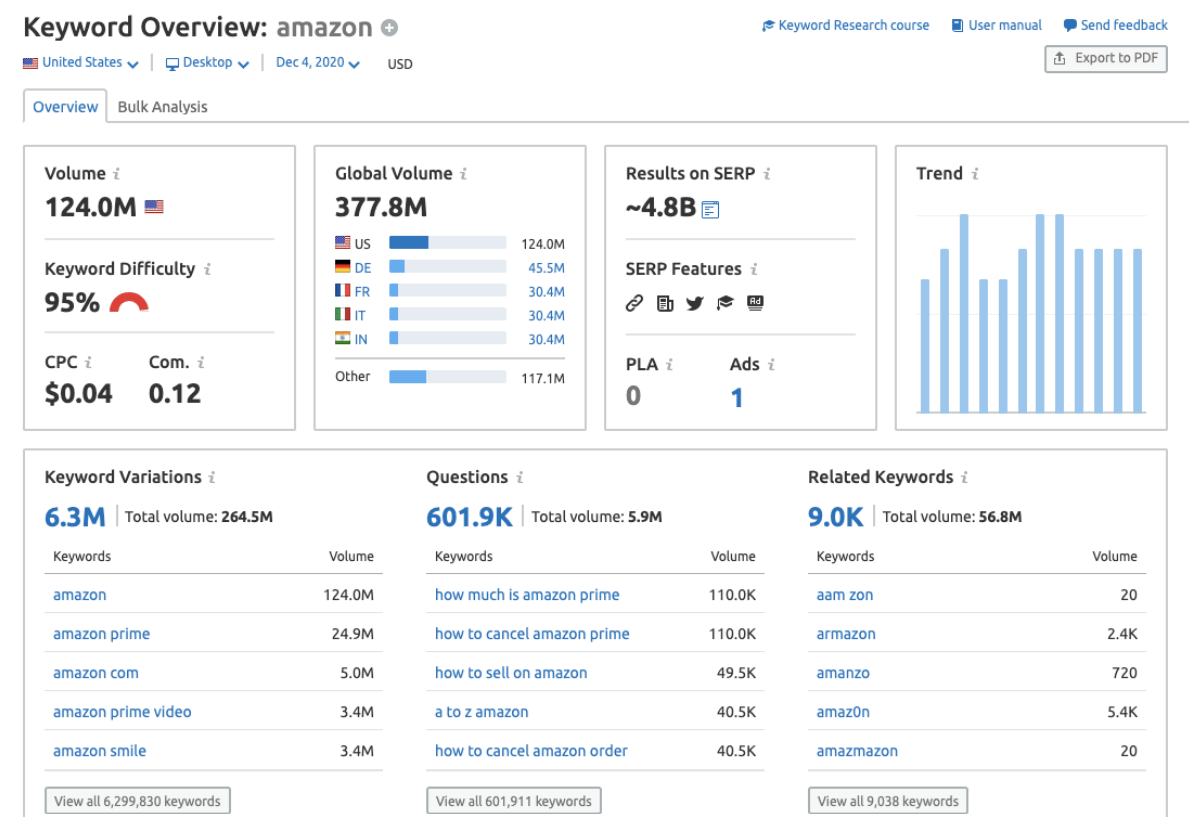
The keyword magic tool is the main keyword research tool that Semrush offers. You can find broad match, exact match, and phrase match keywords for paid search ads or simply get a list of all related keywords for SEO.
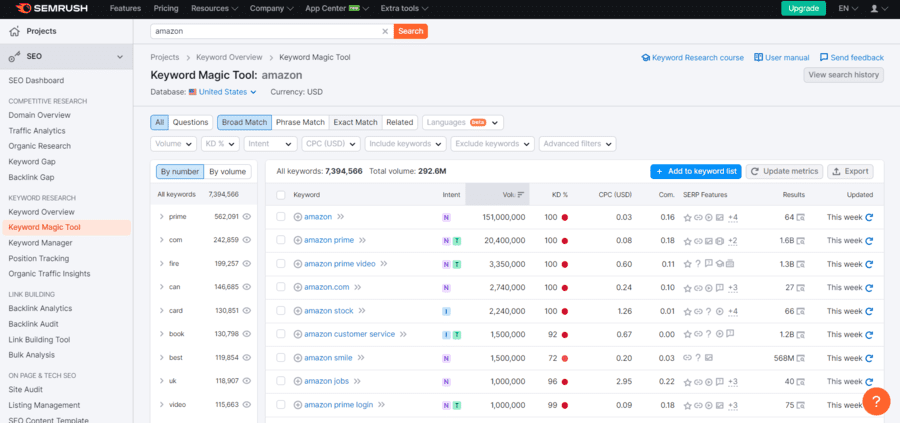
In contrast, Similarweb has a keyword research tool that you can use to find target keywords and sort them based on parameters like volume, competitiveness, etc. You can also use it to monitor your niche’s search traffic data and trends.
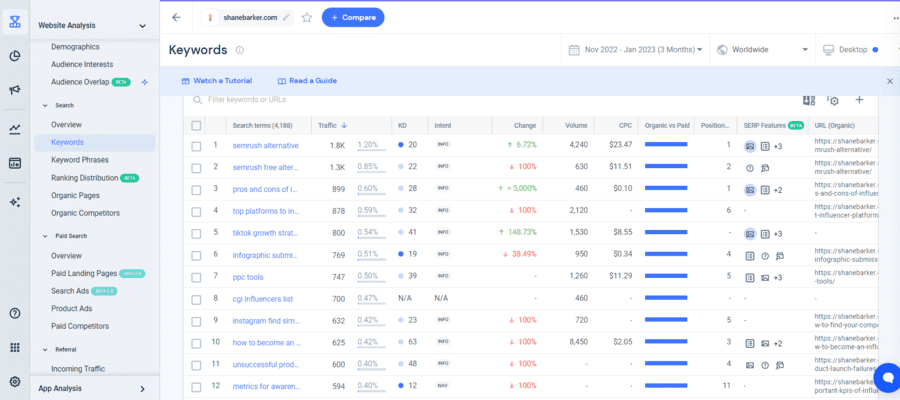
Similarweb Keyword Tool
It’s much less complicated than Semrush, offering you the most valuable information on one simple dashboard.
The Similarweb Keyword tool has plenty of filters to narrow down your keyword research including search engine, paid/organic search, branded or non-branded, keyword intent, and even SERP features.
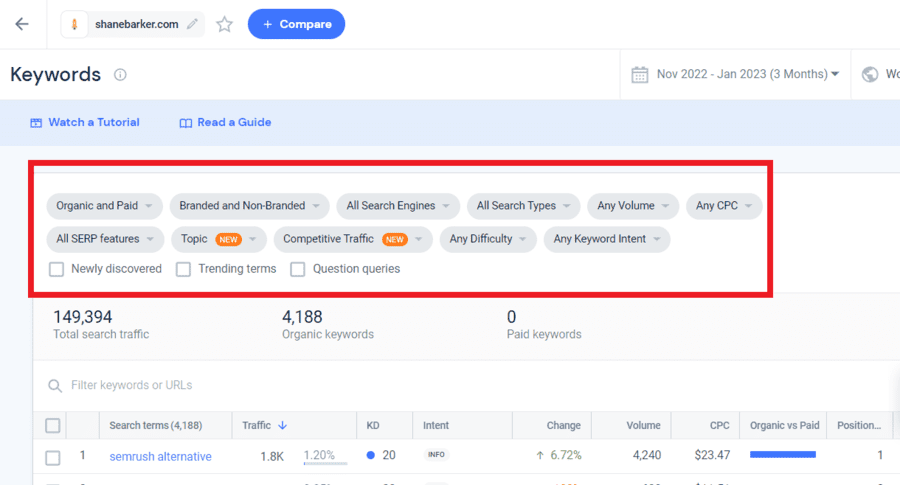
The Keyword Phrase tool shows all keywords used on a site and displays their percentage of search traffic sent to the website. It’s a great way to quickly identify high and low-performing keywords.
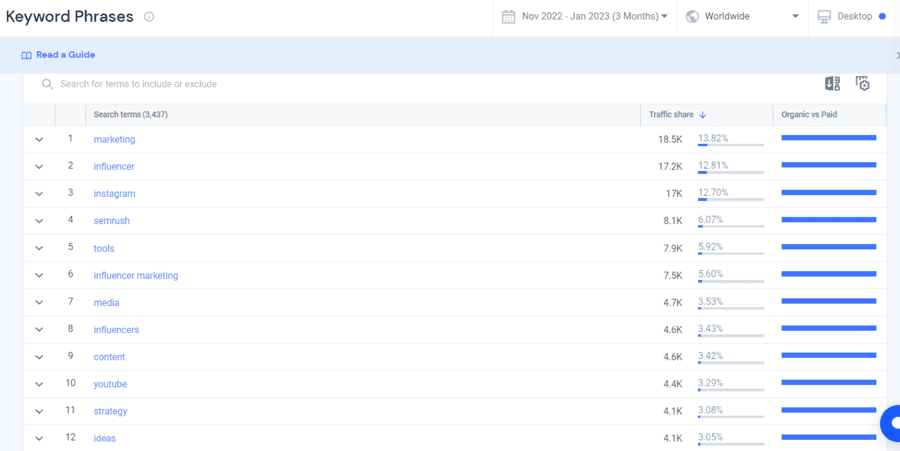
Overall winner: Similarweb
It might come as a surprise, but the overall ease of use, combined with an in-depth, customizable filter, Similarweb makes researching keyword performance and finding new keywords easy and simple.
Semrush vs. Similarweb: Social Media Analysis
Semrush has a social media toolkit that consists of a
- Social Poster
- Social Tracker
- Social Analytics
- Social Inbox
- Influencer Analytics
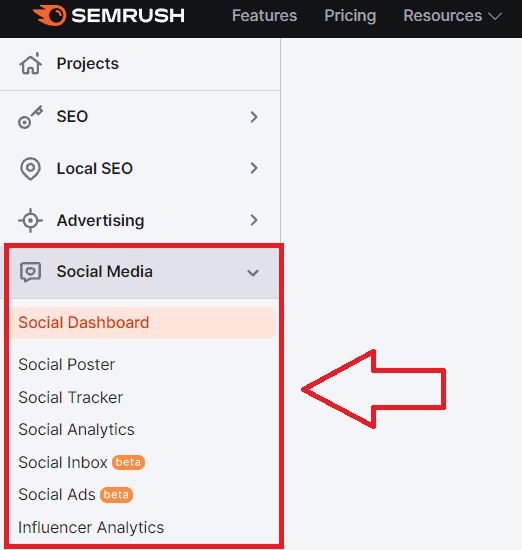
One highlight of their social media toolkit is the social media tracker.
It quickly offers an overview of all connected social accounts and their performance. It can also provide insights into the number of website visits coming from each social media account.
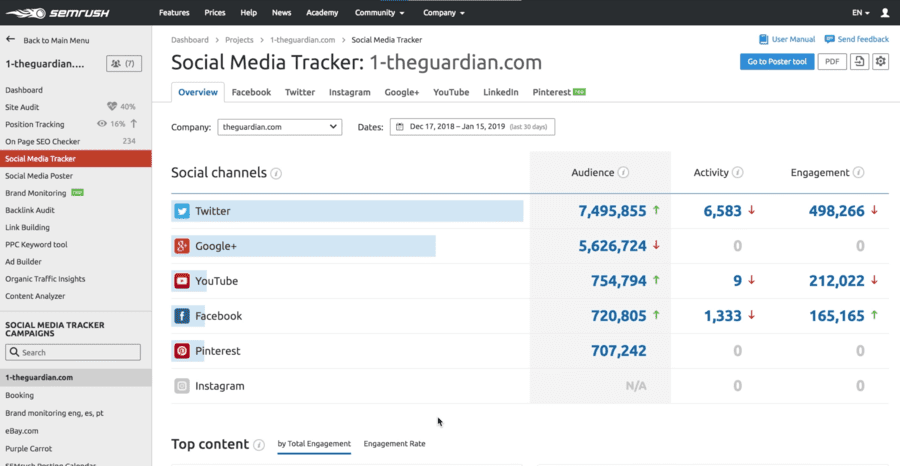
Semrush also acts as a social media content planner, allowing you to create posts, and schedule them. Semrush’s social media inbox will then connect all messages and comments together in one convenient inbox.
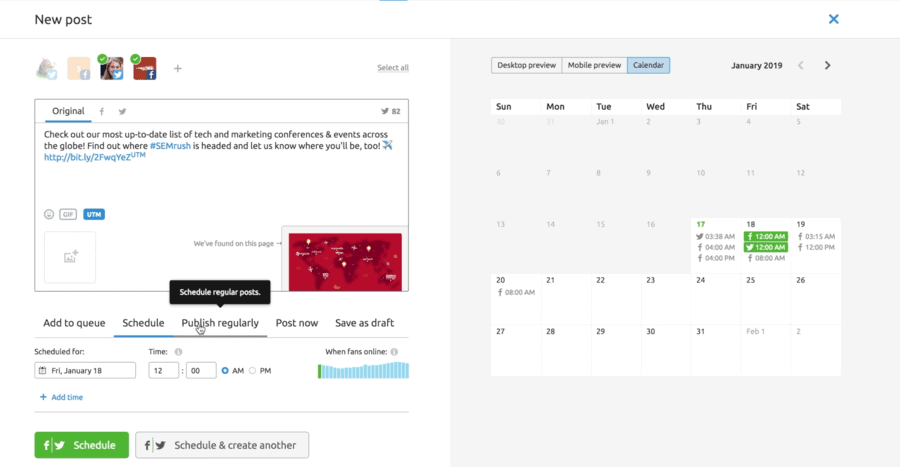
Similarweb has a social media analytics tool, but that’s about where it ends.
It’s a great way to find out how well your social media accounts are doing, and how many visitors to your website come from each social media account, but that is all it has to offer.
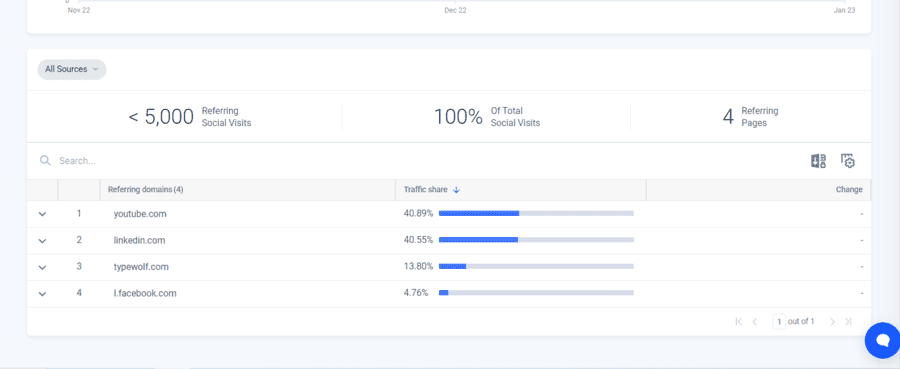
The social media overview dashboard looks great, and is easy to use, but lacks any extra features that Semrush offers like a social media inbox, and content scheduler.
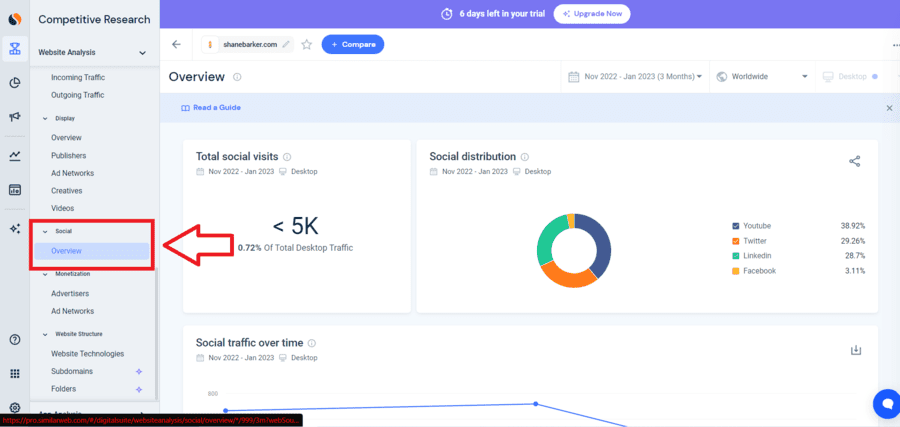
Overall winner: Semrush
Semrush doesn’t just offer social analytics but allows you to run all your social media accounts from the Semrush platform itself, essentially acting as a content marketing tool.
Semrush vs. Similarweb: Competitor Analysis
Semrush’s competitive research is split into:
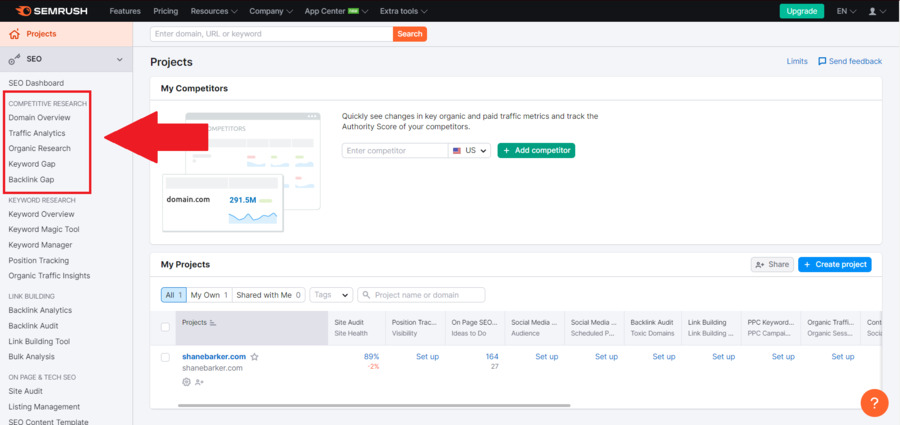
The Keyword Gap tool is an extremely useful tool that can be found on both Semrush and Similarweb.
Both Keyword Gap Tools offer similar analytics, allowing you to compare keywords from your competitors, how well they’re ranking, and keywords you might be losing out on.
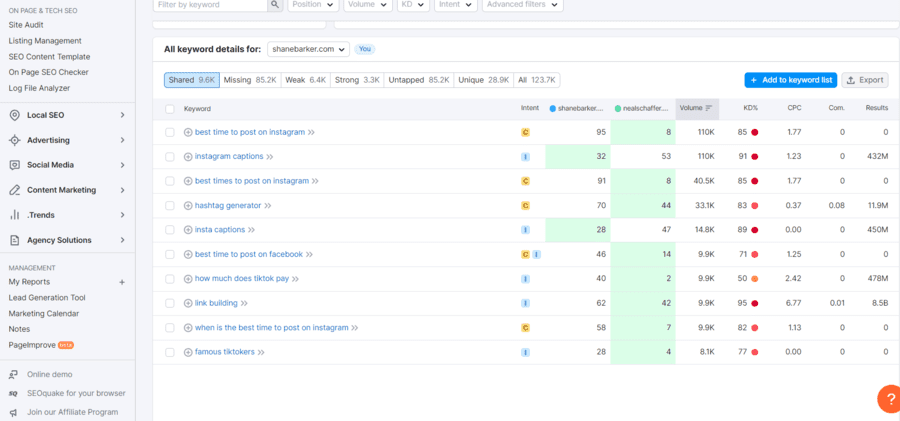
Semrush Keyword Gap Tool
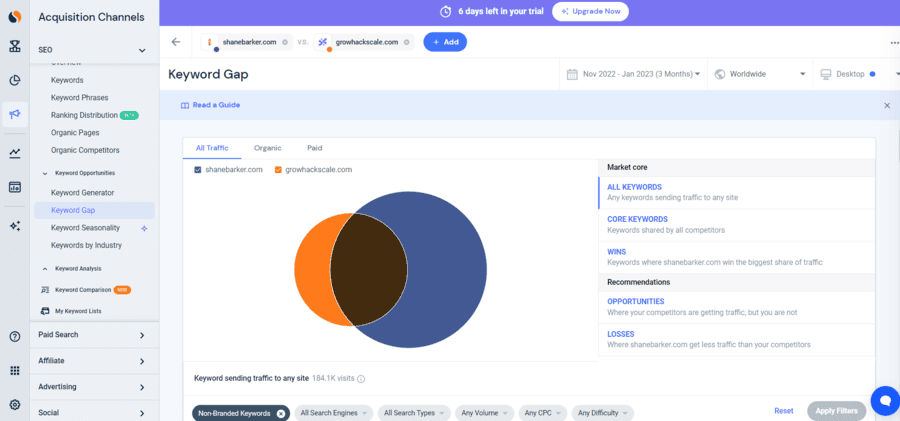
Similarweb Keyword Gap Tool
Both bring up a keyword overlap graph and offer weak keywords that aren’t ranking well against your competitors.
Semrush offers a list of keywords, with their volume, KD, and CPC of competitors versus your website, allowing you to quickly gauge how your keywords are performing against them.
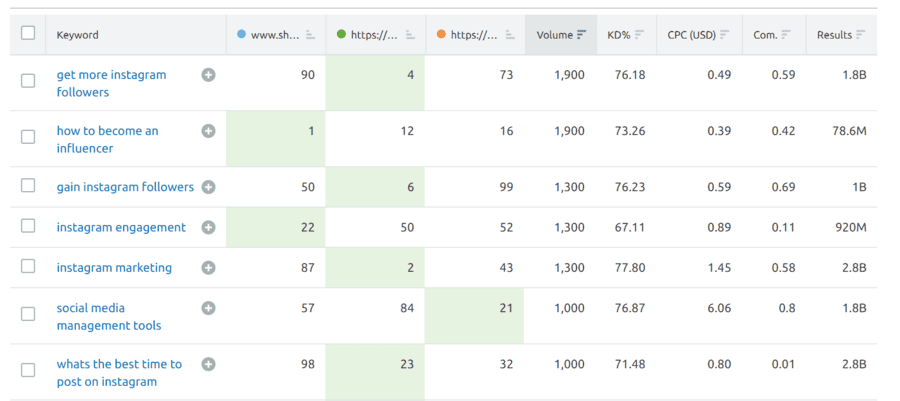
Just like Semrush, Similarweb also has some competitor analysis and benchmarking features. It allows you to benchmark your traffic data with competitors across various channels.
Simply go to “similar sites” and you’ll find competitors with some basic analysis already.
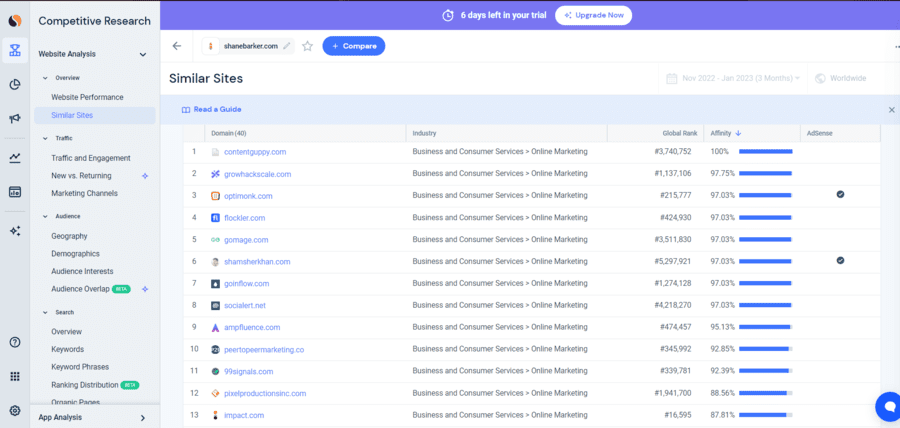
You can also use this to study your competitors’ strategies and identify things that you can incorporate into your SEO or content strategy by clicking on a competitor.
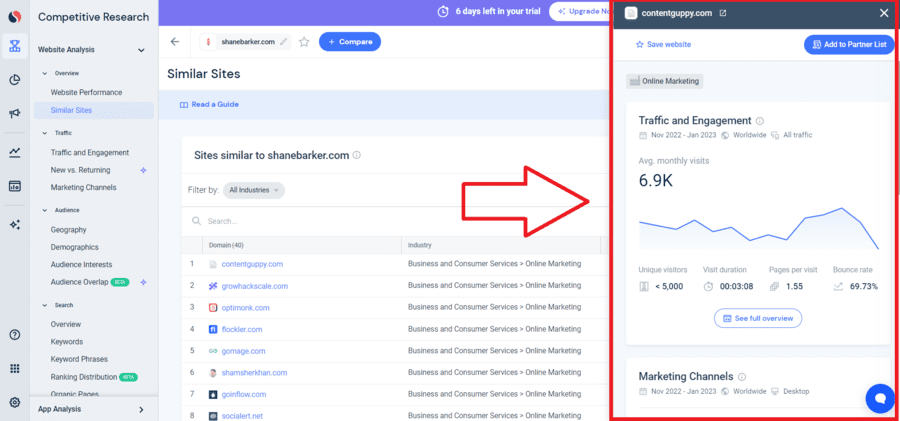
One tool I really like is the competitive tracker tool that offers quick insights into your website’s performance against 25+ competitors. It shows how well you’re performing in different areas vs. all these competitors, with a quick summary for each.
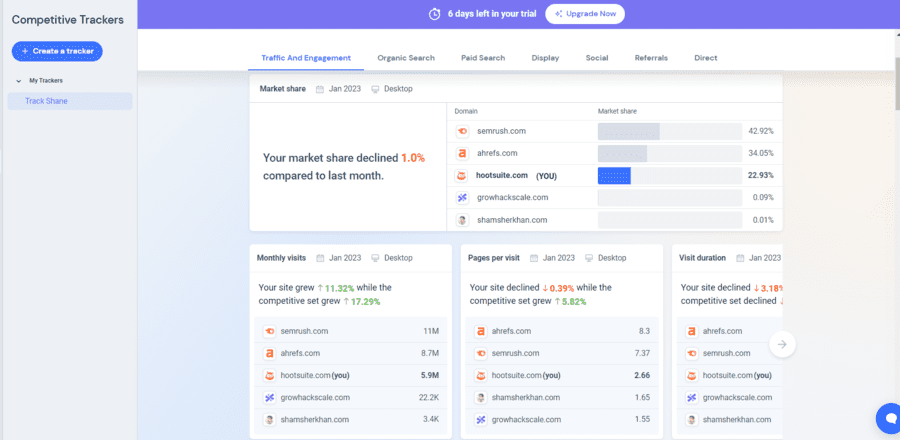
Similarweb’s Keyword Gap Tool is on par with Semrush’s and offers almost exactly the same results.
Overall winner: Semrush
Broadly speaking, Similarweb offers a breadth of competitive analysis tools that may look the same as Semrush. However, when I used both platforms, I felt that Semrush was in this instance much easier to use and navigate.
Some of the features from Similarweb like the Keyword Gap Tool aren’t actually listed under competitor research, but under acquisition channels, which was confusing, but makes sense in that Similarweb isn’t as SEO-focused, but more focused on competitive research.
Semrush vs. Similarweb: Traffic Analysis Tool
You can use Semrush traffic analytics to get in-depth traffic data for your website and even compare it with your top competitors.
Audience insights, traffic journey, geo-distribution, subdomains, top pages, and bulk analysis are some notable insights that you can get under various tabs in Semrush traffic analytics.
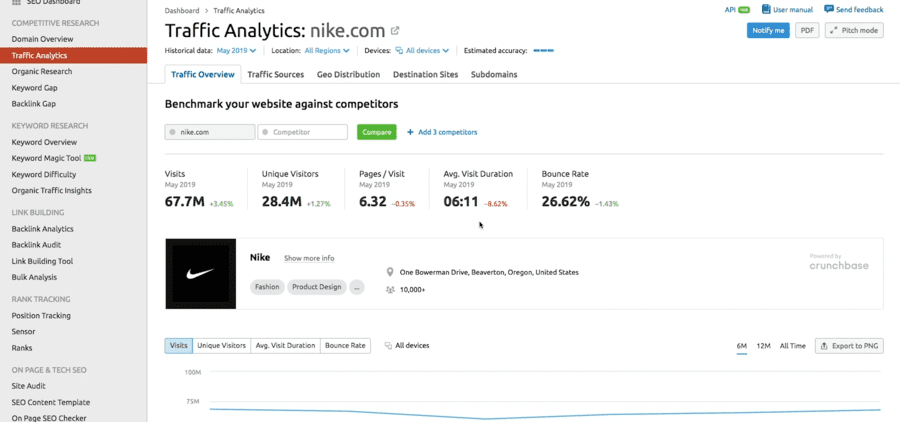
You’ll also get some more insights such as traffic by source, traffic by countries, as well as filtering these insights according to set parameters like date, and bounce rate.
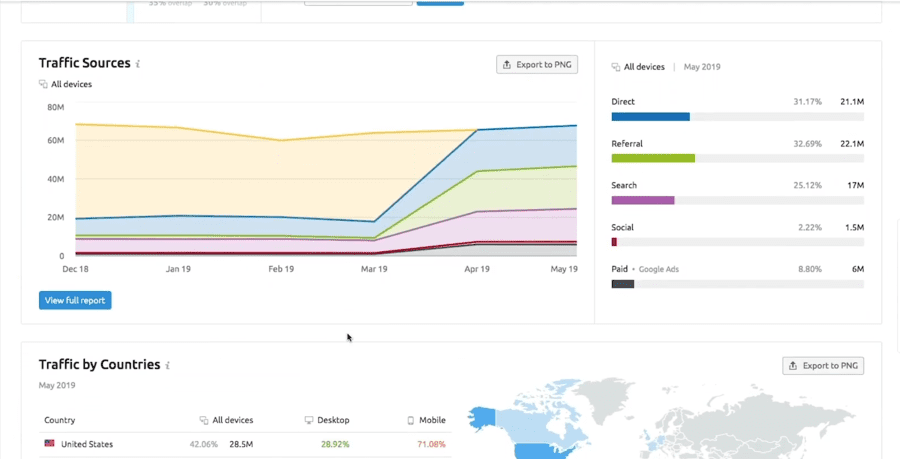
Similarweb’s traffic insights you’ll find underneath traffic and audience. Here you can find all the information about your site’s traffic, where it's coming from, who your audience is, as well as competitor traffic insights.
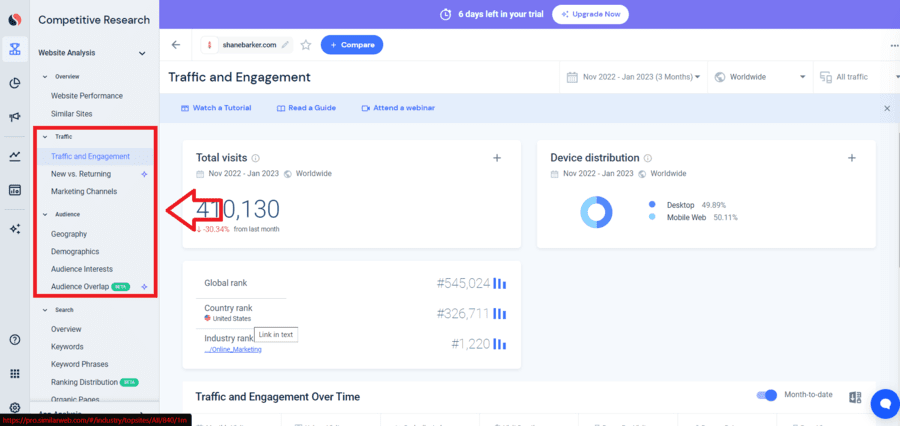
If you go to “audience” you’ll find some quality info about your audience. There you can look at geographical data, demographics such as age and gender, as well as audience interests.
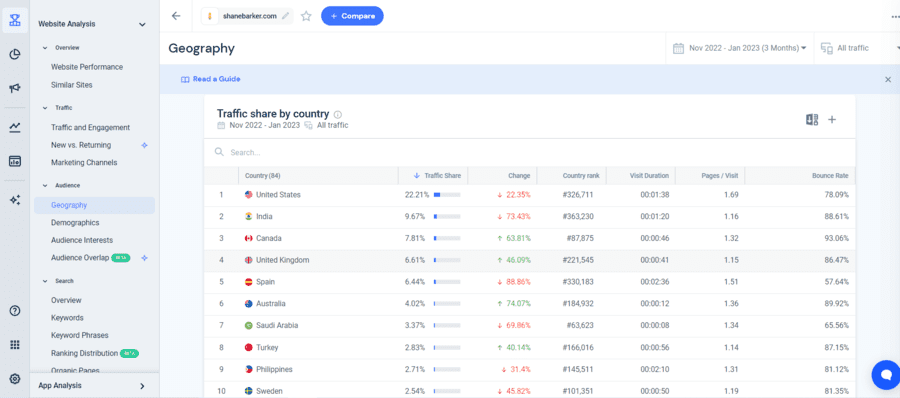
Similarweb Audience Geography
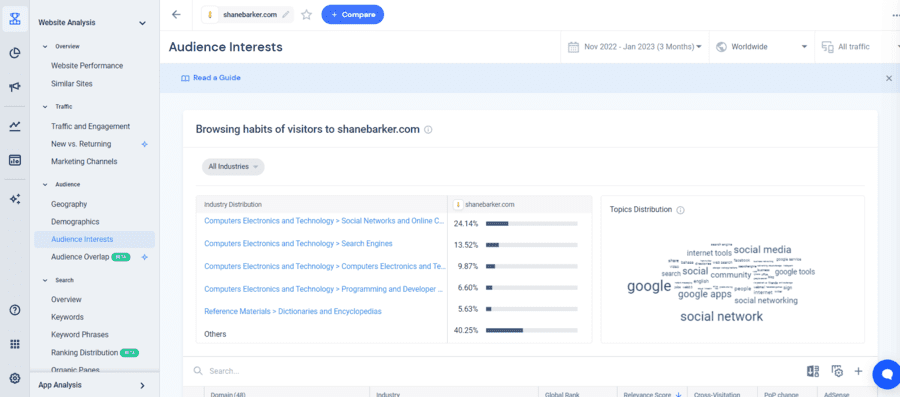
Similarweb Audience Interests
Overall winner: Similarweb
It was a tough call, as the competition between Semrush and Similarweb was close regarding traffic analytics. Similarweb closely wins this battle, as its easy interface and in-depth look into your traffic and audience is ever so slightly better than Semrush.
Considering Similarweb isn’t designed specifically for SEO, but more with website analysis and competitor analysis in mind, it makes sense that its traffic analytics are better than Semrush, although only by a little.
Semrush vs. Similarweb: Backlink Analysis
Semrush
Semrush is the industry leader in backlink software. There are a lot of tools, and it can become a bit complicated with all the information available, but the UI is still comprehensible after some use.
The backlink tools offered by Semrush are:
- Backlink Analytics
- Backlink Audit
- Backlink Gap
- Link Building Tool
- Bulk Analysis
The backlink analytics tool helps you to discover backlinks to you on other websites. Simply enter a website, and you’ll get all the backlink information of that website.
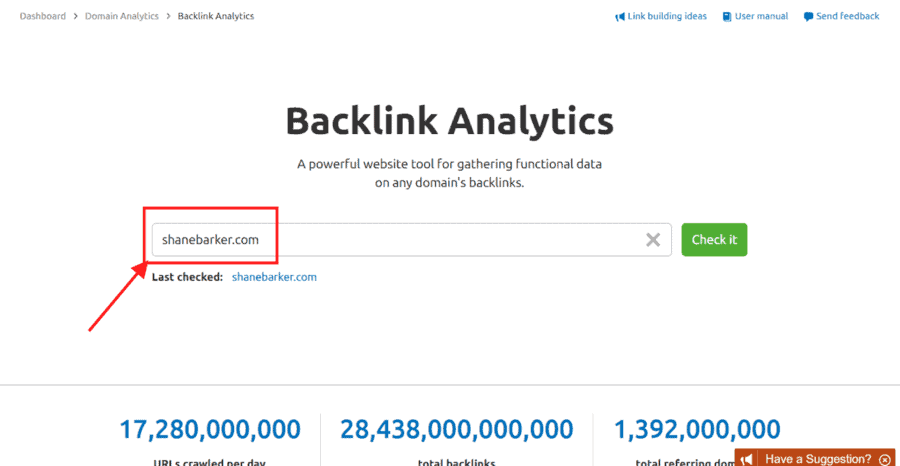
It’ll show you the website’s traffic, referring domains, backlinks, categories, and even the anchor text used.
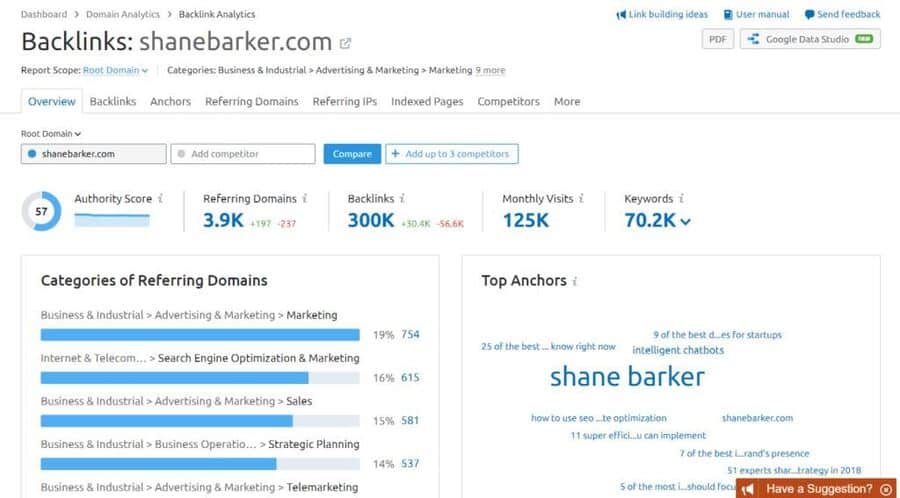
The backlink audit tool is special to Semrush, and you won’t find anything similar on Similarweb.
A backlink audit provides an overview of the websites linking back to you. It will display a score for each website, called a toxicity score. This will help you identify any toxic websites that might be linking to your site.
Semrush comes up with a toxic score for your backlinks based on numerous toxic markers that you can analyze.
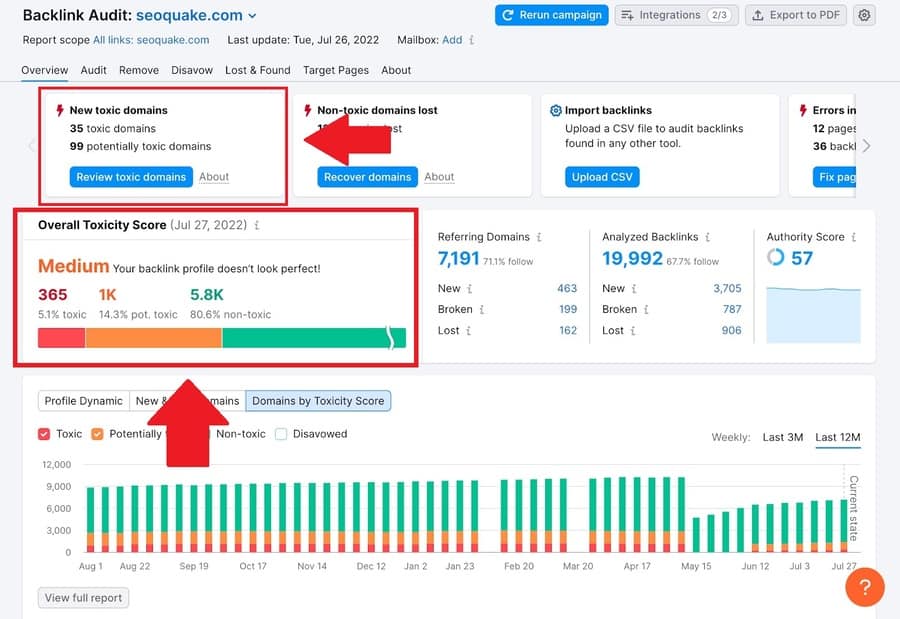
Removing these sites will help you increase your Google authority score.
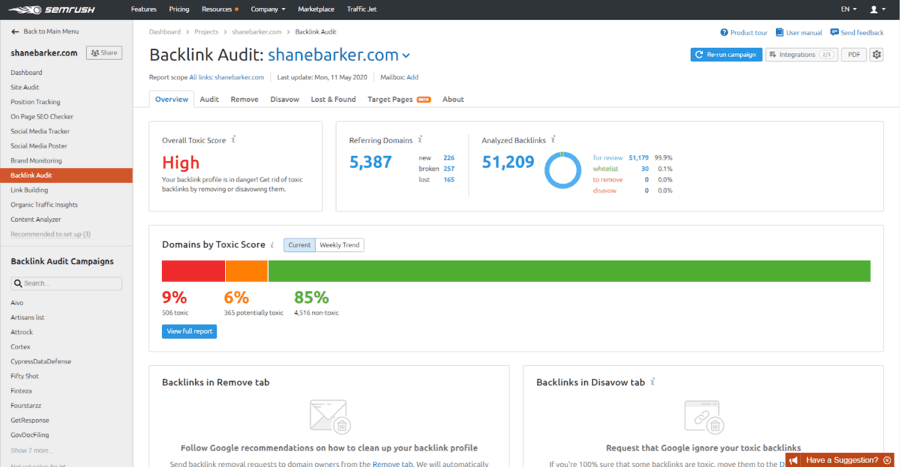
The backlink gap tool helps find websites from which your competitors have acquired backlinks. You can then approach these websites to get backlinks.
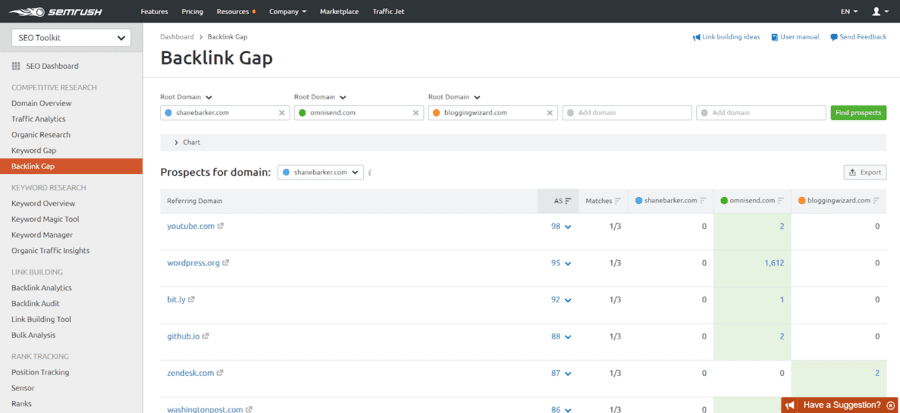
Bulk Analysis
The bulk analysis tool is a quick way to get insights on many URLs. Simply enter all the URLs you’d like backlink information on, and hit search.
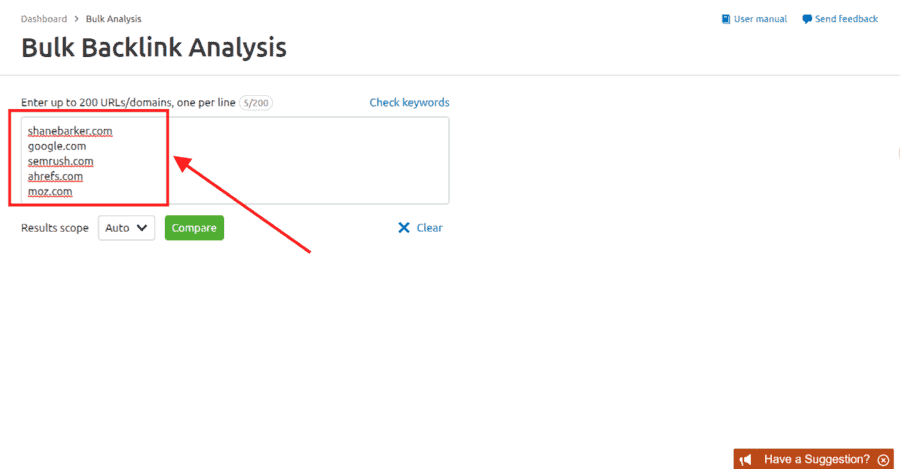
Using it, you can compare the backlinks of up to 200 domains, subdomains, subfolders, and URLs at a time.
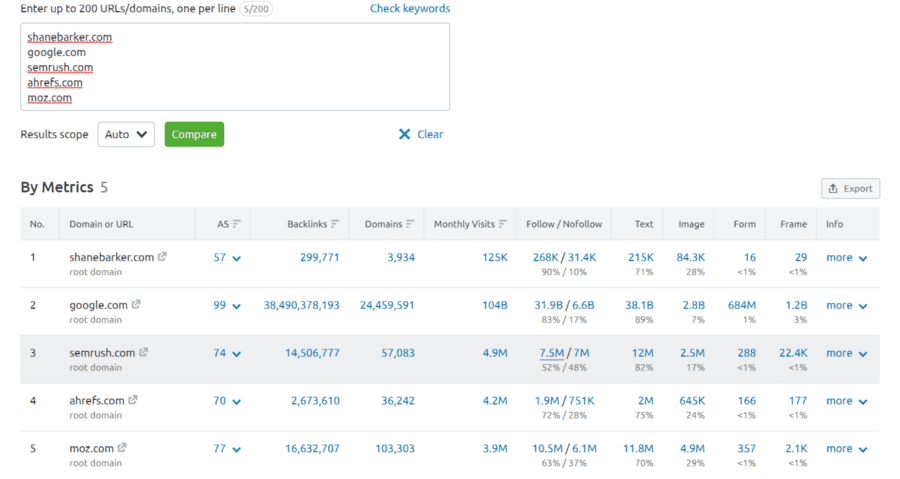
Similarweb offers two tools that provide details about the incoming and outgoing link traffic of a website. Using them, you can find sites backlinking to your website or your competitor’s.
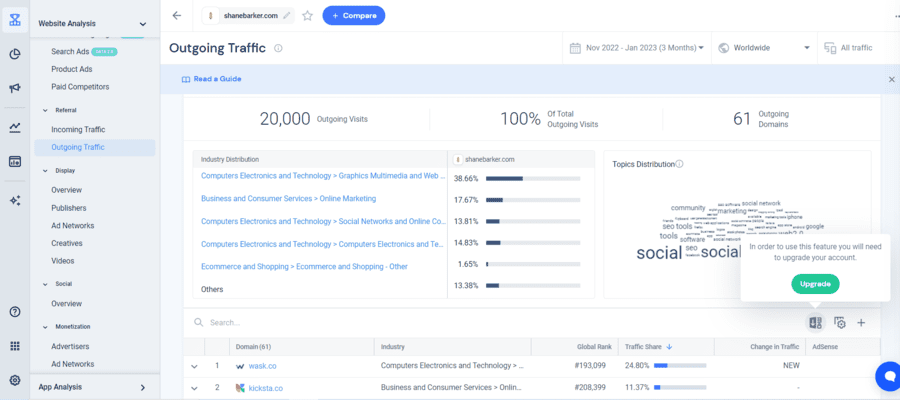
Use this to find, analyze, and optimize your backlinks and affiliates. You can also conduct a referral website traffic analysis for your competitors.
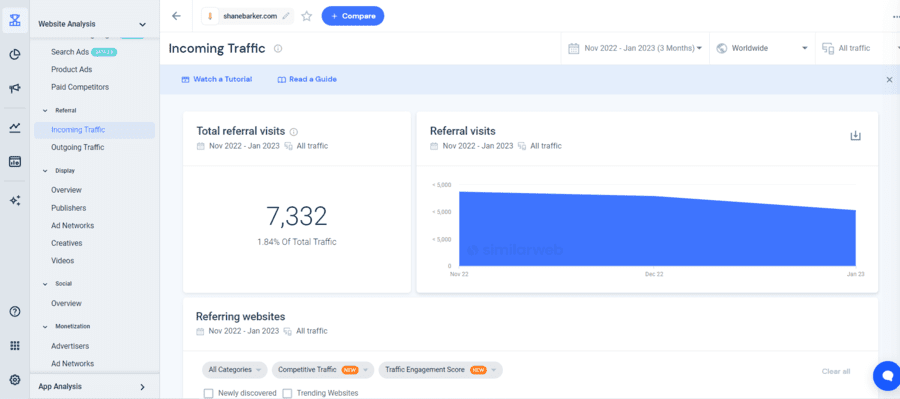
Similarweb has now also introduced a premium Backlink Analysis feature, but it is only available with custom plans (meant for large teams and enterprises). It offers insights into a website’s referring domains and backlinks (new and lost).
Overall winner: Semrush
Similarweb cannot match some of the more advanced features that Semrush offers, like a comprehensive backlink audit.
Semrush vs. Similarweb: Pricing
Semrush has 3 pricing tiers:
- Pro plan: $139.95/month
- Guru plan: $249.95/month
- Business plan: $499.95/month
Semrush offers three balanced tiers, with their lowest package great for small businesses, and their business plan an excellent option for large agencies and organizations.
You can save up to 17% of the cost if you pay annually.
They also offer extra features for an additional price:
- Semrush .Trends: $289/month per user
- Semrush Local: $20/month for the basic plan and $40/month for the premium plan
- Semrush Social: $29.99/month
- Social Content AI: $29.99/month
- Agency Growth Kit: Starting from $69/month
- ImpactHero: $200/month
Similarweb’s pricing plans:
- Starter plan: $199/month
- Professional plan: $449/month
- Team plan: Custom pricing
- Enterprise plan: Custom pricing
You can save up to 25-35% on their pricing plans by opting for annual billing.
With Similarweb, you get access to website traffic analysis and competitor research, historical data, worldwide geo view, and keyword analysis.
They also offer add-ons like:
- App Intelligence
- Search Intelligence
- Market Intelligence
These add-on tools do not showcase clear pricing info. You’ll need to request a demo and custom quote to get started.
Overall winner: Semrush
Semrush’s 3-tier pricing plan offers everything needed to get your site traffic and SEO where it should be, even at its lowest-priced tier.
Pro Tip: Both tools offer a free trial period, which makes each of them easy to try out and form your opinion. Both Semrush and Similarweb’s free trials are paid versions and offer most of what the platform has.
Where Does Semrush Get Its Data?
Firstly, Semrush has its own web crawler, which continually scans the internet to collect data on websites, keywords, and backlinks.
It gathers information on domain authority, page authority, organic search traffic, and other valuable data. This data is then used to create detailed reports on website performance and keyword ranking.
Semrush also uses data from third-party sources, including data providers like Google, Bing, and other search engines.
This allows the platform to access a wealth of valuable information, such as search volume, keyword difficulty, and search trends. Semrush also uses data from social media platforms like Facebook, X (Twitter), and Instagram to help users understand their social media presence.
Semrush has partnerships with various data providers, which allows the platform to offer even more extensive data. These partnerships provide Semrush with access to data on ad spend, competitor research, market analysis, and much more. Some of the major data providers that Semrush partners with include Google Analytics, Majestic, and Ahrefs.
Where Does Similarweb Get Its Data?
The platform collects data from a broad range of sources, including web crawlers, proprietary databases, and partnerships with third-party providers.
By combining these various data sources, Similarweb offers a comprehensive and accurate representation of a business's online presence.
One of the primary sources of data for Similarweb is web crawlers. These crawlers automatically scan the internet, gathering information about various websites and online platforms.
This data includes traffic volumes, referral sources, and search engine optimization (SEO) performance.
Another significant data source for Similarweb is its proprietary databases. These databases contain vast amounts of data collected from millions of websites, apps, and other online platforms.
The data is processed and analyzed using machine learning algorithms, which helps Similarweb provide accurate and reliable insights into businesses' online behavior. Additionally, the company has partnerships with third-party providers, which further expands its data collection capabilities.
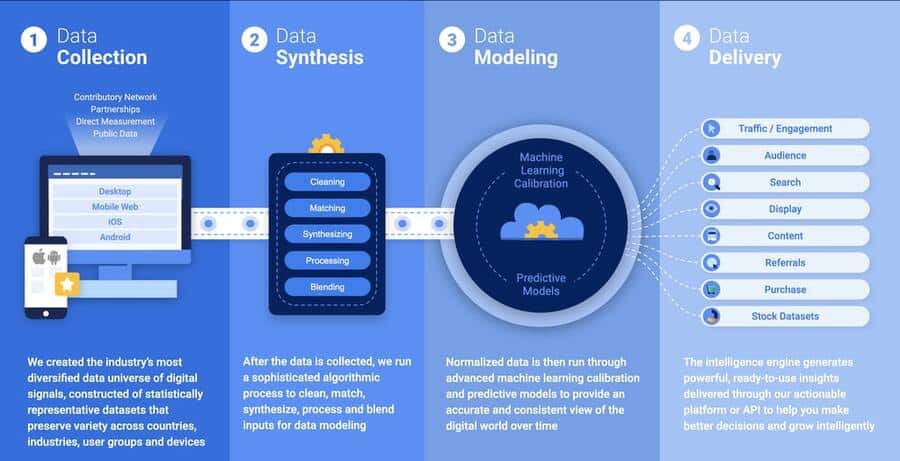
Semrush vs. Similarweb: Which SEO Tool Should You Choose?
If you’re stuck on choosing Semrush or Similarweb, it can honestly be difficult, as both are excellent tools in their own right.
When to Use Semrush
Semrush is very much an all-in-one tool that focuses heavily on SEO but has content marketing, social media marketing, market research, and even customer relations management tools.
Sure, it has a bit of a learning curve, but once you’ve mastered it, there aren’t many other tools you’ll need to manage your website. That’s why I recommend Semrush for all users, even beginners.
If you’re a small business with very little capital, even the free version of Semrush will offer some valuable insights, although upgrading to the pro version is highly recommended.
For larger businesses, looking for a tool that can offer all website analytics, as well as optimization recommendations and rankings, Semrush’s Guru plan is the perfect fit.
When to Use Similarweb
Similarweb is a bit of a different story. Similarweb doesn’t offer much regarding SEO optimization and is much more focused on pure statistics.
Where Semrush has a bit of a learning curve, especially in navigating all the features, Similarweb is much easier to navigate and learn how to use. The issue comes with the data that it offers.
Semrush helps nudge you along and shows you areas that need fixing, as well as offers solutions on how to fix them. Similarweb, not so much.
It offers more insights and data, but unless you’re well-versed in SEO and website analytics, you won’t know what to do with the massive information dump you get from Similarweb.
That’s why I recommend Similarweb for professionals in the digital marketing field, who are detail oriented and will know what to do with the data made available from Similarweb.
With that in mind, to really pick the right tool, you need to know what you want from these tools. Similarweb has more focus on site-wide statistics, offering deep insights on where traffic comes from, audience interests, which pages are ranking well, and competitor traffic insights.
FAQs
Q1. Which one is affordable: Similarweb or Semrush?
A: Semrush is the more affordable option, starting with the pro plan at $139.95/month.
Q2. Do Semrush and Similarweb offer refunds?
A: Semrush does offer a 7-day money-back guarantee for all plans. Similarweb does not offer refunds after a package has been purchased.
Q3. Who are Similarweb’s competitors?
A: Similarweb has plenty of competitors, including:
Semrush
Ahrefs
Moz
SpyFu
Q4. Does the platform offer a free trial?
A. Semrush – Yes, you can get a free 14-day Pro plan trial right here.
Similarweb – Similarweb has a 7-day free trial.
Q5. What are the terms and conditions for the free trial/plan?
A. Semrush – You can use all the features of the Pro plan for the duration of the trial. You will be charged for your chosen plan only after the trial ends, and you can cancel anytime during the trial if you don’t like it.
Similarweb – As part of the free trial, you can get 3 months of free web traffic analytics and 1 month of mobile app data. But, you can only see 5 results per metric and need to upgrade to the paid plan for full access. This trial lasts for 7 days only.





